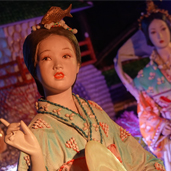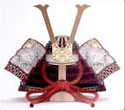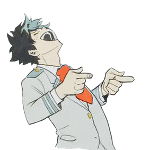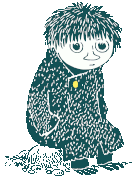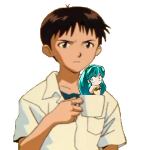|
I'd like to parrot the prior recommendations for Yasutaka Tsutsui, as great English translations exist for all of his really popular works now. I'm partial to Paprika but pretty much everything else he writes is great. It's very different than the Kon-directed film adaptation though, so don't go in expecting it to be the same. For those of us who read Japanese, I can't recommend Morimi Tomihiko enough, specifically The 4.5 Tatami Mat Mythological Chronicles (四畳半神話体系) and A Record of Sights and Sounds in the 4.5 Tatami Kingdom (四畳半王国見聞録). There aren't any immediate plans to translate either, and the prose is pretty difficult to read, but they're both excellent books. I'm actually doing some grad research right now translating the first one. Fumiko Enchi's The Waiting Years (女坂) is an excellent read about femininity and struggles with masculinity from Meiji to the post-Meiji era. It's a pretty interesting book and the translation is excellent.
|
|
|
|

|
| # ? Apr 18, 2024 07:01 |
|
I have a problem. After I get finished reading this collection of Akutagawa short stories, I need to choose between either Musashi/Arrowroot combo by Tanizaki and Box Man by Abe. Can someone here help me decide?
|
|
|
|
Smoking Crow posted:I have a problem. After I get finished reading this collection of Akutagawa short stories, I need to choose between either Musashi/Arrowroot combo by Tanizaki and Box Man by Abe. Can someone here help me decide? I really enjoyed Musashi/[iArrowroot[/i], and they're both very short, so there's no reason not to read it... laplace posted:For those of us who read Japanese, I can't recommend Morimi Tomihiko enough, specifically The 4.5 Tatami Mat Mythological Chronicles (四畳半神話体系) and A Record of Sights and Sounds in the 4.5 Tatami Kingdom (四畳半王国見聞録). There aren't any immediate plans to translate either, and the prose is pretty difficult to read, but they're both excellent books. Are either or both of these the novel that was adapted into The Tatami Galaxy? I though that was a fantastic series, and it's sad that it's not getting translated. It's probably sf-ish enough for Haikasoru, and they release some pretty boring stuff.
|
|
|
|
Smoking Crow posted:I have a problem. After I get finished reading this collection of Akutagawa short stories, I need to choose between either Musashi/Arrowroot combo by Tanizaki and Box Man by Abe. Can someone here help me decide? Box Man. Then again I'm a bit biased.
|
|
|
|
I got through Ryu Murakami's The World in Five Minutes from Now(五分後の世界) a few days ago. No English version even though it's considered one of his best books. The plot deals with an parallel world version of Japan where they don't surrender after the atomic bombings and continue to fight WW2 until the 1990's. By this point Japan's population is only 260,000 people who live in a complex of underground tunnels, while the surface has been colonized by the allies and is an awful place to live. The main character is from the historical version Japan and ends up in the parallel world and joins the underground society. It's definitely as uncomfortable to read as his other books like Audition or Piercing; there's a lot of gruesome battle descriptions, it's also depressing as an American because the plot involves the US trying to exterminate the Japanese population. There's also a sequel and a visual novel sequel for the PS2, I haven't gotten to the second book, but I have the game and it's pretty good as well. Other than that, I didn't think the vocabulary and style were especially difficult. I'll probably read Ryu Murakami's The Fascism of Love and Fantasy(愛と幻想のファシズム) next. That one's about two Japanese people who meet in Alaska, a survivalist and an independent filmmaker. They return to Japan which faces an economic crisis and political stagnation, and end up forming a fascist political organization. It feels like a more political version of Coin Locker Babies. It's also pretty interesting because it still feels timely(even though it was written before the economic bubble burst). The creator of the anime Evangelion named the characters of Aida and Suzuhara after the two main characters of this book too, so I'm a bit curious to see if there's any more similarities.
|
|
|
|
To Chi Ka posted:I got through Ryu Murakami's The World in Five Minutes from Now(五分後の世界) a few days ago. No English version even though it's considered one of his best books. I have this sitting on my shelf but haven't opened it yet. I used to love Ryu when all I had read was Coin Locker Babies. Almost Transparent Blue was ok but In the Miso Soup and Audition just didn't interest me all that much and I think there are better authors doing the same stuff. I need to get back to him at some point.
|
|
|
|
z0331 posted:I have this sitting on my shelf but haven't opened it yet. I'm a big fan of his work, but there's definitely bad writing from time to time. Even in The World in Five Minutes from Now, the protagonist is the president of a rape fetish pornographic movie company, and it just felt like superfluous detail instead of adding anything. I feel like Ryu Murakami can't ever write a novel having at least one character like this. One of my friends is also reading through Run, Takahashi!(走れ、タカハシ!) which is a collection of short stories about baseball. It's much more light-hearted without any of the excessive sex and violence in his other novels. I would recommend that book and his essay collections as well.
|
|
|
|
Sorry for necroing the thread a bit, but I just finished 1Q84 (my first Murakami, which, according to most reviews I've read, might not have been the ideal entry point to his novels) and I would like to hear people's views on a few points, and hopefully someone more acquainted with the man could clarify some things for me. Firstly, the book's language felt a bit... not unemotional, but everything from cooking breakfast to violent sex to elves marching out of a dead goat was reported quite matter-of-factly, not really judging or evaluating anything one way or the other - with "tolerant, wholesome curiosity", as a reviewer put it. I found this charming, actually, but I'm still a bit unsure whether it's the author's style or (at least partly) an element of the translation (I read the book in English). I've got more Murakami waiting in my to-read pile, so I'm going to delve deeper regardless - and I should probably reiterate at this point that I am indeed completely new to him (and hope that I won't be laughed off the thread for asking this) - but would you say this description is consistent with his other work? Secondly - this is more a personal niggle, and specifically about this book - I was slightly put off by how the narration's point of view wasn't entirely consistent. If you're going to have multiple POV characters, I felt that the narrator's point of view, third-person though it may be, should then stay pretty rigidly on these characters in their own chapters. Now we had some information occasionally bleeding over from one character's chapters into another's narration, even though this information had not yet been established in this character's point of view. It's not like this created any noticeable plot holes or that it's a major flaw or anything, but I just found it a bit annoying - especially since the book, with its 1000+ pages, hardly shied away from repeating things from different perspectives otherwise.
|
|
|
|
I never did get into 1Q84. I hate just going off what others have said, but I have a feeling it is a bit overly wordy and dull from the first bit of the book and can't make it further. It's probably a tough introduction to his works. Thankfully there is a cheat-sheet you can use for future readings  Even though he revels in surrealism I always thought his writing is rather matter-of-fact regardless, and I enjoy it for that. Sputnik Sweetheart is an absolute favorite of mine because of this. I have no idea how much of that could account for translation though.
|
|
|
|
Daniel Morales at How to Japanese does a really good job at examining the changes made to Murakami's writing in translation: http://howtojaponese.com/ In my opinion, 1Q84 suffers from lack of time spent on translation - usually a lot of editing goes on during the translation process, and the global hype machine was too fierce to allow that to happen fully. 'Editing' in the Japanese publishing industry is very different than in the Anglo-american industry, especially for someone as popular as Murakami. It felt unfinished to me, in a way that a 1000+ page novel just shouldn't.
|
|
|
|
Murakami also, I would argue, tries to portray a sense of emotional detachment that exists in modern society. The continuous lists of mundane tasks are attempts by the characters to have some sort of control and safety within existence. I think if you dig a little you can see that characters do have emotional reactions to things, but they are generally pretty deadened. As for the editing thing, yeah - Murakami has basically said that he writes until he feels like he's finished and then passes it on to the editor who then checks for spelling and leaves the rest as-is. Originally 1Q84 was only two volumes but then he felt he hadn't finished it so wrote a third. The English version was translated by two people, including Jay Rubin who has no qualms about simply cutting out sections despite the English edition not saying its abridged. He literally erased two chapters of material from Wind-up Bird Chronicle that are actually kind of significant. I don't know what/if he's removed from 1Q84 but chances are he has. Murakami used to not even check with his translators and would just let them do whatever they wanted. I think he's recently taken a more active role in the process, though.
|
|
|
|
z0331 posted:The English version was translated by two people, including Jay Rubin who has no qualms about simply cutting out sections despite the English edition not saying its abridged. He literally erased two chapters of material from Wind-up Bird Chronicle that are actually kind of significant. Well that's super obnoxious. Wind-up Bird Chronocle is one of my favorite Murakami books, can you spoil what happens in those two chapters that he took out?
|
|
|
|
Guy A. Person posted:Well that's super obnoxious. Wind-up Bird Chronocle is one of my favorite Murakami books, can you spoil what happens in those two chapters that he took out? Argh I knew someone would ask and it's been long enough that I can't remember the details too well. I do know that one section was about Creta and basically explained why it was she left since in the English version she just sort of disappears. The other chapter I think contained a scene where he has a sort of hallucination/vision in the pool that adds to the significance of the underground sections and also has a section that fleshes out the image of the wind-up bird noise, which is of course a hugely important theme. I know I'm being vague because I can't entirely recall, plus I haven't actually read the English edition. A friend of mine wrote a paper where he translated the missing sections which is basically how I know. Also, while I perhaps made it sound entirely like it was Rubin's fault, to be somewhat fair American publishers I think pressured him to try to make cuts to make it cheaper to print. Japanese book bindings are generally a lot cheaper than American, plus they have little problem with publishing books cut into multiple volumes, so there's less issue with writing gigantic tomes. Regardless of the reason for the cuts, though, I think it's bullshit that English readers aren't informed that there are, in fact, missing sections.
|
|
|
|
z0331 posted:Argh I knew someone would ask and it's been long enough that I can't remember the details too well. Haha, no worries. Since it is still my favorite of his books I obviously didn't feel like I missed too much at the time, and a lot of the things in the book in general are left vague and mysterious anyway. I was more irritated because I feel cheated out on more writing, and was just generally curious on what kind of stuff was cut out, not as much about concrete answers (I'm not one of those types who gets pissed at LOST or whatever for not answering enough questions for example). I agree that they should have included a translator's note about what was missing and the reasons for taking it out, that's bullshit.
|
|
|
|
Thanks z0331, I didn't know about it either. I think the book still reads quite well in any case.
|
|
|
|
I don't read Japanese, but recently I read Yukio Mishima's Confessions of a Mask which I found pretty amazing. He has a rare ability to hold my attention. I'm pretty sure if he wrote a book about paint drying, I'd love it. People in the know, what are the best english translations to get? I've seen a lot of his stuff by Vintage but I've heard their translations are bit off. I know a couple of Russian novels I've read by Vintage were less than stellar compared to Penguin.
|
|
|
|
Swim Good posted:I don't read Japanese, but recently I read Yukio Mishima's Confessions of a Mask which I found pretty amazing. He has a rare ability to hold my attention. I'm pretty sure if he wrote a book about paint drying, I'd love it. People in the know, what are the best english translations to get? I've seen a lot of his stuff by Vintage but I've heard their translations are bit off. I know a couple of Russian novels I've read by Vintage were less than stellar compared to Penguin. I don't think there are multiple translations of most of his works, and Wikipedia seems to agree with me. I didn't even know Penguin had any of his books - I thought they were all done by Vintage. If you're looking for recommendations, I would read The Temple of the Golden Pavilion which is kind of a mindfuck of a book. If you're still on a Mishima kick, go with the Sea of Fertility tetralogy which will give you plenty of his special brand of insanity.
|
|
|
|
z0331 posted:I don't think there are multiple translations of most of his works, and Wikipedia seems to agree with me. I didn't even know Penguin had any of his books - I thought they were all done by Vintage. The Sailor Who Fell From Grace With the Sea is also great if you're looking for something on the shorter side. It has probably the most horrifying yet beautiful passage that I've ever read.
|
|
|
|
Can anyone recommend a translation of The Tale of Genji? I'm leaning towards the Penguin Classics Deluxe Edition since it's unabridged and has good reviews.
|
|
|
|
barkingclam posted:Can anyone recommend a translation of The Tale of Genji? I'm leaning towards the Penguin Classics Deluxe Edition since it's unabridged and has good reviews. That's the one. Royall Taylor. Hands DOWN.
|
|
|
|
I noticed Boris Akunin, giving the annual lecture at the Translation Prizes last week, had a thing or two to say about Mishima:quote:When I was translating “Kinkakuji” (“The Temple of the Golden Pavilion” as it is known in the West), I had at hand the English translation – very meticulous, authorized by Mishima himself. Everything was impeccably correct – and yet still something was amiss.
|
|
|
|
Quoting myself from pimping this thing in another thread:z0331 posted:
|
|
|
|
Tonde Mo Nai posted:Cogwheels is in the Jay Rubin translation under the title "Spinning Gears". http://www.amazon.com/dp/0140449701/ref=rdr_ext_tmb and in the Mandarins collection under Cogwheels. http://amzn.com/0977857603 Next I'm going to start The Box Man by Kobo Abe and Confessions of a Mask is on the list. After I found out The Woman in the Dunes (the movie, highly recommended btw) was based on a novel by him, I just needed to read some of his books. If someone knows both, how do the novel and movie compare? Sometimes reading the book a film you like is based on can be off-putting (though it's usually the reverse).
|
|
|
|
Here's something some of ya might enjoy: Researchers discovered a previously unknown novel by Yasunari Kawabata. It's a serial he wrote for a newspaper at 27 and somehow it slipped through the cracks over the years.
|
|
|
|
Wow, how has no-one mentioned The Autobiography of Fukuzawa Yukichi yet? It's an awesome, unfiltered account of a fascinating man's life during one of the most interesting periods of Japanese history. Fukuzawa Yukichi was the second son of a low-ranking samurai under the Tokugawa Shogunate. Since his elder brother was going to become the family head, that gave Fukuzawa plenty of leeway to gently caress off and do what he always wanted: study. He consumed all the major Confucian texts, and became very interested in Western learning--so when Comodore Perry showed up with his Black Ships, Fukuzawa leveraged the opportunity to go study Dutch medicine and language in Nagasaki. He quickly became one of the foremost experts in Japan on the West, learning Dutch and English, and he volunteered for the first Japanese diplomatic expedition to the West. His accounts of America, France and England really have to be read. When he returned he wrote a series of extraordinarily-popular books, was appointed official translator to the Shogun, and became wrapped up in the troubles surrounding the Boshin War. Since the rebels hated anything to do with the west, Fukuzawa had to dodge assassination attempts left and right despite his best attempts to remain neutral. That's the biographical info, but what you don't get a sense of is how drat funny and personable Fukuzawa is. He didn't exactly write his autobiography, he recounted his life story to a friend while someone sat there and wrote down everything in shorthand. It's very conversational, with lots of great anecdotes and stories liberally sprinkled in along with frank opinions of his contemporaries. Samurai peeing on samurai, casual sacrilege, debates on the poo poo tax, drunken college stories, Daimyo taking a dump in the middle of the Louvre, trolling other samurai...it's a great read. He waited until the diplomatic voyage was halfway back to Japan before casually mentioning: "Oh yeah, did any of you guys get your picture taken with an American girl?"  "Awww yeah."
|
|
|
|
Vengarr posted:Fukuzawa Yukichi Thanks for posting about him. I'll probably try to get around to his autobiography. Just a quick glance at Wikipedia and yeah, the dude was pretty important.
|
|
|
|
Has anyone here read Murakami's latest? I mean, it may be a little early and it hasn't been translated yet, but if anyone's knowledgeable about it, it'd be you guys. Bonus: What's a good starting point for Murakami? I know that Windup-Bird Chronicle is good, but it had sections removed in English. Is there anything else to start with?
|
|
|
|
Smoking Crow posted:Has anyone here read Murakami's latest? I mean, it may be a little early and it hasn't been translated yet, but if anyone's knowledgeable about it, it'd be you guys. I started with Hard Boiled Wonderland and the End of the World. It was an interesting point to start with because it's so wacky and it changes what the hell is going on every other chapter, but it was recommended to me as a place to begin. Personally I think Norwegian Wood is an excellent place to start but it's probably more tame than some of his other stuff. I've really only read his more relationship focused books to be honest.
|
|
|
|
My first book was A Wild Sheep Chase, and I've been hooked ever since. It had all the elements that I like about Murakami. Norwegian Wood is probably a good starting point, too.
|
|
|
|
I was lent Kafka on the Shore and then the same person lent me The Wind-Up Bird Chronicles and then got annoyed when I wanted more immediately and I had to go start buying my own. I thought Kafka was a fairly good introduction, it has all the trademark Murakami stuff (magic realism, weird noir tone, a bit of subdued sexual deviancy, etc.), although it is a little long. I lent one of my friends A Wild Sheep Chase as an introduction since it was shorter and fulfilled the same criteria, although to my knowledge he didn't become immediately hooked, so I may have failed in my mission there.
|
|
|
|
Here's a neat piece at The New Yorker on Murakami and translation, both from Japanese to English and vice versa. Anyone ever checked out Monkey Business International, the magazine it briefly touches on?
|
|
|
|
Ah yes the humble Japanese author who mysteriously success in the translation when the New Yorker feels the need to publish something on or by him every week. I'm sure he also just accidentally holds obnoxious PR events to increase his news coverage where select fans get to listen to him ramble about random topics for half an hour and it was some sort of publishing error that caused there to be a delay betweeen the publication of his previous book's two volumes in Japan and nobody expected that it would attract media attention. Just a shame the author of this week's piece didn't take the argument about literature succeeding in translation to quite the conclusion that 日本語が亡びるとき did.
mystes fucked around with this message at 00:48 on May 10, 2013 |
|
|
|
Well, okay then... Monkey Business is great and I think everyone in this thread interested in modern Japanese lit would love it. I've got the newest issue right here: authors include Jin Keita (a taster), Takahashi Gen'ichiro, Yokomitsu Riichi, EnJoe Toh (2012 Akutagawa winner), Furukawa Hideo, Kawakami Hiromi, Ii Naoyuki, and Kawakami Mieko. Monkey Business launched their latest issue with an event in New York, all of which you can watch online. Guests included novelist Paul Auster, poet Charles Simic, novelist and critic Gen'ichiro Takahashi, and tanka poet Mina Ishikawa. Some other things I think people in this thread would be interested in: Death Sentences by Kawamata Chiaki, translated by Thomas Lamarre and Kazuko Y. Behrens, published by University of Minnesota Press. $17.95. University of Minnesota Press posted:Japan, 1980s: A special police squad is tracking down one of the "afflicted" to recover the "stuff." Although the operation seems like a drug bust, the "stuff" is actually some kind of text. Death Sentences—a work of science fiction that shares its conceit with the major motion picture The Ring—tells the story of a mysterious surrealist poem, penned in the 1940s, which, through low-tech circulation across time, kills its readers, including Arshile Gorky and Antonin Artaud, before sparking a wave of suicides after its publication in 1980s Japan. Mixing elements of Japanese hard-boiled detective story, horror, and science fiction, the novel ranges across time and space, from the Left Bank of Paris to the planet Mars. And if any of you happen to be Londoners, there's these two events:
|
|
|
|
mystes posted:Ah yes the humble Japanese author who mysteriously success in the translation when the New Yorker feels the need to publish something on or by him every week. I'm sure he also just accidentally holds obnoxious PR events to increase his news coverage where select fans get to listen to him ramble about random topics for half an hour and it was some sort of publishing error that caused there to be a delay betweeen the publication of his previous book's two volumes in Japan and nobody expected that it would attract media attention. Just a shame the author of this week's piece didn't take the argument about literature succeeding in translation to quite the conclusion that 日本語が亡びるとき did. Please tell me where you stand in the sub v. dub debate
|
|
|
|
barkingclam posted:Please tell me where you stand in the sub v. dub debate
|
|
|
|
I don't think I've ever seen somebody spend that much energy in disliking an author before.
|
|
|
|
I'm a 100 pages into Murakamis The Wind-up Bird Chronicle and while it is interesting enough it starts to display one of the tropes of Japanese culture I find most annoying: It is basically a harem anime. Suddenly all these mysterious women pop into the protagonists life and start to show a great deal of interest in him, all without any efforts (even slight reluctance) on his part. He only ever meaningfully interacts with women and they confess their life stories and deepest feelings while he remains largely detached. Even their characters (and characteristics) could be straight from a harem anime (for example the hurt girl that lives secluded). Perhaps I'm being unfair here but if it continues like this for the remaining 500 pages, without some kind of subversion of this formula, I will be more than a bit annoyed. While personally I cannot stand the harem trope as a phenomenon it's interesting to me. For example Akutagawas Kappa already displays this kind of thinking, which is so foreign to me (and as far as I can tell from limited experience also foreign to the reality of courtship in Japan).
|
|
|
|
That sort of thing isn't exclusive to women so I don't feel it's something to worry about. Murakami characters in general just like to talk about their entire life at the drop of a hat (but that leads to one of the best parts of Wind-up Bird Chronicle so that's fine by me). I've read an interview with Murakami where he said he doesn't care for anime, not even Ghibli stuff. So that's another thing to take into consideration (even though it's obviously not where it's from but hey that means it's free of anime-isms). Srice fucked around with this message at 18:28 on Aug 16, 2013 |
|
|
|
You were quite right, almost immediately after I posted I read Mamiya's story which for me was the best part of the book (and maybe for you as well?) and the most annoying themes were not further developed (some stuff still annoyed me though). It was a somewhat frustrating read for me because it's written in a way that suggests all the strange things will make sense if you solve some kind of riddle and I couldn't solve it. Interpretation is not my forte so I welcome any discussion. Here is my take on it: Pregnancy and abortion are apparently major themes. I would read the treatment that the middle aged women receive as having something to do with the desire to have a child. The same holds for the defilement by Noboru Wataya, however there seems to be more to him. You could even try to associate the importance of water with 水子. But how does all that Manchukou stuff square with this reading? Manchukou as Japan's national dream to have children? Seems a bit forced to me. Of course not everything needs to be explained with the same formula but especially in this case it would be nice to have some starting point. Btw does anyone know if there exists an translation of Yukio Mishima's Natsuko's Adventure? Some googling suggest no but perhaps it is contained in some collection.
|
|
|
|

|
| # ? Apr 18, 2024 07:01 |
|
I just finished 1Q84. I have spoiler questions :o . Tengo's "father" leaves Tengo a photo. Tengo says the women in the photo looks like Kiyoko Yasuda (spelling?), the lady he was having an affair with. And that the man in the photo was not the man that sucked on her breast. Who is the man in the photo? Who was the man that was sucking Tengo's mother's breast? Why was Kiyoko "irrevocably lost?" RebBrownies fucked around with this message at 11:32 on Oct 14, 2013 |
|
|















